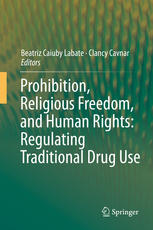

Most ebook files are in PDF format, so you can easily read them using various software such as Foxit Reader or directly on the Google Chrome browser.
Some ebook files are released by publishers in other formats such as .awz, .mobi, .epub, .fb2, etc. You may need to install specific software to read these formats on mobile/PC, such as Calibre.
Please read the tutorial at this link: https://ebookbell.com/faq
We offer FREE conversion to the popular formats you request; however, this may take some time. Therefore, right after payment, please email us, and we will try to provide the service as quickly as possible.
For some exceptional file formats or broken links (if any), please refrain from opening any disputes. Instead, email us first, and we will try to assist within a maximum of 6 hours.
EbookBell Team

4.8
34 reviewsThis book addresses the use and regulation of traditional drugs such as peyote, ayahuasca, coca leaf, cannabis, khat and Salvia divinorum. The uses of these substances can often be found at the intersection of diverse areas of life, including politics, medicine, shamanism, religion, aesthetics, knowledge transmission, socialization, and celebration. The collection analyzes how some of these psychoactive plants have been progressively incorporated and regulated in developed Western societies by both national legislation and by the United Nations Drug Conventions. It focuses mainly, but not only, on the debates in court cases around the world involving the claim of religious use and the legal definitions of “religion.” It further touches upon issues of human rights and cognitive liberty as they relate to the consumption of drugs. While this collection emphasizes certain uses of psychoactive substances in different cultures and historical periods, it is also useful for thinking about the consumption of drugs in general in contemporary societies. The cultural and informal controls discussed here represent alternatives to the current merely prohibitionist policies, which are linked to the spread of illicit and violent markets. By addressing the disputes involved in the regulation of traditional drug use, this volume reflects on notions such as origin, place, authenticity, and tradition, thereby relating drug policy to broader social science debates.